




Tales of Magic in Ancient Egypt




Khufu and the Magicians is an ancient tale of Egyptian magic. This appears in the Westcar Papyrus (Second Intermediate Period - around 1500 BC), housed in the Berlin Museum.
... the text does seem corrupted, if you ask me. There are lots of weirdnesses in this text which might indicate that a child was learning in school and attempting to copy it. The handwriting for one thing is puerile. There also seem to be places where the person writing it has left something out.
-- Geoff Graham
The setting is in the Fourth Dynasty and Pharaoh Khufu's sons are amusing their father by telling tales of magic.
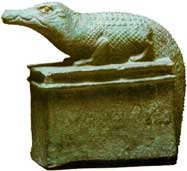 Prince Khafra told the first tale was of a magician who's wife was seeing a beautiful young man in her service, behind her husband's back. Before long, the butler reported the adultery to his master, who then created a tiny wax crocodile. Knowing that the youth bathed in the lake each evening, the magician bid the butler to toss it in the lake as the youth entered. Doing as his master commanded, the wax crocodile was flung into the lake. Suddenly, it turned into a giant living reptile, and snatched up the youth, taking him down to the bottom of the lake. A little later, the magician told Pharaoh Nebka of the story of the crocodile, who came to the magician's house one night. Calling up the crocodile, it dropped the youth, unharmed, before the two men. Telling of the adultery, the magician commanded the crocodile to take the youth again. It did as commanded, and disappeared with the youth, never to be seen again. Pharaoh commanded that the adulterous wife was the be burned alive, her body destroyed, and her ashes tossed into the Nile.
Prince Khafra told the first tale was of a magician who's wife was seeing a beautiful young man in her service, behind her husband's back. Before long, the butler reported the adultery to his master, who then created a tiny wax crocodile. Knowing that the youth bathed in the lake each evening, the magician bid the butler to toss it in the lake as the youth entered. Doing as his master commanded, the wax crocodile was flung into the lake. Suddenly, it turned into a giant living reptile, and snatched up the youth, taking him down to the bottom of the lake. A little later, the magician told Pharaoh Nebka of the story of the crocodile, who came to the magician's house one night. Calling up the crocodile, it dropped the youth, unharmed, before the two men. Telling of the adultery, the magician commanded the crocodile to take the youth again. It did as commanded, and disappeared with the youth, never to be seen again. Pharaoh commanded that the adulterous wife was the be burned alive, her body destroyed, and her ashes tossed into the Nile.
On hearing this story, Khufu praised the magician's power and made offerings to the kas of the pharaoh and the magician.
Djadjaemankh
Prince Baufra tells the tale of Pharaoh Sneferu. Being bored, Sneferu calls his priest and magician, Djadjaemankh, for some entertainment.
"I have traveled around every room of the palace and searched for an amusement, but I have not found any."
"Let Your Majesty go to the palace lake and fill your galley with all the beautiful women of your harem. Your Majesty's heart will be refreshed by seeing them rowing from downstream to upstream. You will see the beautiful nesting spots along the shore of your lake. You will see its fields and its beautiful banks and your heart will be refreshed by it."
"Indeed, I shall go rowing! Have brought to me twenty ebony oars worked in gold with handles of skeb wood worked in fine gold. Have brought to me twenty women with beautiful bodies and breasts and hair who have not given birth. And have brought to me twenty nets and give these nets to these women in place of their clothes."
 Just as they reached the middle of the lake, the lead rowing maiden had tangled the oar handle in her hair, and her fish-shaped pendant of turquoise had fallen into the waters, where it quickly vanished beneath the surface. She grew silent, and ceased her rowing. Sneferu, on asking what was wrong, offered to replace the trinket for her, yet she refused.
Just as they reached the middle of the lake, the lead rowing maiden had tangled the oar handle in her hair, and her fish-shaped pendant of turquoise had fallen into the waters, where it quickly vanished beneath the surface. She grew silent, and ceased her rowing. Sneferu, on asking what was wrong, offered to replace the trinket for her, yet she refused.
Feeling for her loss, Sneferu called on his magician. Using his magic skills, Djadjaemankh pile half the water of the lake up on top of the other, and descended to the lake bed. He found the ornament sitting on a pottery shard, and was able to recover it.
His Majesty spent the day as a holiday with the entire palace and rewarded the lector priest Djadjaemankh with every good thing.
On hearing the completion of this tale, Khufu gave many offerings to the kas of Sneferu and Djadjaemankh.
Djed-djedi
Finally, Prince Hordedef stood and spoke. Instead of a tale of the past, this prince spoke about what he knew of his own time.
"...But there is a man, your Majesty, of your own time but unknown to you, who is a great magician." His Majesty said, "What is this Hordedef my son?" Prince Hordedef replied, "There is a commoner, Djed-djedi is his name, who lives at Djed-djed-Sneferu. He is a man of one hundred and ten years; every day he eats five hundred loaves of bread, a haunch of ox is his meat, and he drinks one hundred jugs of beer as well. He knows how to reattach a severed head and how to make a lion follow him with its leash on the ground. And he knows the number of secret chambers in Thoth's temple."
Wishing to model his own tomb on that of the secret rooms in the Temple of Thoth, Khufu ordered his son to bring the magician to him.
After a long journey, Hordedef managed to reach the magician. Plying him with offers of delicacies and all good things, Djed-djedi agreed to go to the court of Khufu with his family and collection magical spell papyri.
"Djed-djedi, why is it that I have not seen you before?" Djed-djedi answered, "When one is summoned, one comes, Oh Sovereign, may you live, prosper, and be healthy. I have been called and I have come." His Majesty asked, "Is it really true, this talk of your knowing how to reattach a severed head?" Djed-djedi said, "Yes, it is I who know, Oh Sovereign, my lord, may you live, prosper, and be healthy."
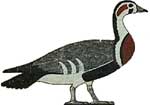 Khufu then ordered a prisoner brought, thinking to lop off his head and see Djed-djedi's magic. Protesting, the magician said that he could not sacrifice humans for his magic. Instead, they found a goose Djed-djedi could work his magic upon.
Khufu then ordered a prisoner brought, thinking to lop off his head and see Djed-djedi's magic. Protesting, the magician said that he could not sacrifice humans for his magic. Instead, they found a goose Djed-djedi could work his magic upon.
The goose was placed on the west side of the courtyard with the head on the east. Then Djed-djedi recited his magic spells and the goose began waddling and the head moved also. When they had approached each other they joined and the goose stood up honking. The another bird was brought to him and he did to it likewise. His Majesty had an ox brought to him and its head was made to fall upon the earth. Again, Djed-djedi said his words of magic and the ox arose. Then he made a lion follow along behind him with its leash trailing on the earth.
After this display, Khufu realised that maybe the rumour about the magician were true. He questioned the magician on the number of secret chambers in the Temple of Thoth, but again the magician protested. He only knew the location of the place, in the flint chest named 'Inspection' in a tomb in Iunu (On, Heliopolis).
Pressing the magician further, Djed-djedi told the pharaoh that it could only be brought to him by the eldest of the triplets, who were still in the belly of Raddjedet, wife of a wab priest of Ra. These children, the magician prophesied, would inherit the kingship of the land of Egypt.
Trying to placate the pharaoh as his heart had grown heavy at the words, Djed-djedi told him that his son, and his son's son would rule before a child of Raddjedet. Asking when the woman was to give birth, Djed-djedi told the pharaoh that she would bear her children on the 15th day of the first month of winter.
His Majesty said, "It is then that the sand banks of the canal will be dry! I would have crossed over myself to see the temple of Ra, Lord of Sahbu."
"Then I will make four cubits of water over the sand banks so you can cross," said Djed-djedi.
Djed-djedi consented to stay with Prince Hordedef, until the appointed time.
After some time, Raddjedet began to suffer her very difficult labour. Ra sent for the deities skilled with creation and childbirth. Isis and her twin Nephthys. Meskhenet, the goddess of the birthing brick, and Heqet, frog headed goddess of childbirth. Khnum, the creator god who fashioned men on his potters wheel before breathing life into them also came.
Then the Majesty of Ra, Lord of Sakhebu, said to Isis, Nephthys, Meskhenet, Heqet and Khnum, "Please will you go that you may deliver Raddjedet of the three children which are in her body. They will become kings of this entire land; they will build your temples, endow your offering tables, provide your libations, and make bountiful sacred offerings for you."
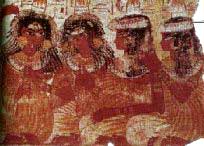 Disguising themselves as travelling musicians and dancers, with the god as their porter, the goddesses set off for Rawoser's house. The priest of Ra, Raddjedet's husband, greeted them but told them of the problems with his wife's labour. The four goddesses offered their services, still disguised, saying they were midwives, skilled in the arts of easing childbirth pains. Gratefully, Rawoser let them in.
Disguising themselves as travelling musicians and dancers, with the god as their porter, the goddesses set off for Rawoser's house. The priest of Ra, Raddjedet's husband, greeted them but told them of the problems with his wife's labour. The four goddesses offered their services, still disguised, saying they were midwives, skilled in the arts of easing childbirth pains. Gratefully, Rawoser let them in.
Entering the birthing room, the deities sealed themselves inside. Isis stood before Raddjedet, Nephthys behind while Heqet hurried the birth.
Isis spoke, "Don't be strong in her belly, you whose name is called Strength!" and a child rushed forth upon her arms - a child one cubit in length. His limbs were of gold and his royal head cloth of real lapis. They washed him and cut his cord. Then Meskhenet went to him and said, "A king who will rule throughout this entire land." And Khnum gave health to his body.
Again Isis stood before her and Nephthys behind her while Heqet hastened the birth. Isis spoke, "Don't walk in her belly, you whose name is called Feet of Ra!" and a child rushed forth upon her arms - a child one cubit in length. His limbs were of gold and his royal head cloth of real lapis. They washed him and cut his cord. Then Meskhenet went to him and said, "A king who will rule throughout this entire land." And Khnum gave health to his body.
A third time Isis stood before her and Nephthys behind her while Heqet hastened the birth. Isis spoke, "Don't be darkness in her belly, you whose name is called Dark!" and a child rushed forth upon her arms - a child one cubit in length. His limbs were of gold and his royal head cloth of real lapis. They washed him and cut his cord. Then Meskhenet went to him and said, "A king who will rule throughout this entire land." And Khnum gave health to his body.
Leaving the mother with her three sons, Rawoser rewarded them with a large sack of barley. Isis suggested they create three crowns and place them in the sack, and return the grain to the house of the triplets. Creating a rainstorm, the deities returned, still disguised, and asked Rawoser to keep it for them, out of the rain, until they return for it. Then they left.
 After a fortnight, Raddjedet had purified herself, and asked if the house was in order. Everything was good, except they had no beer. Unfortunately, the only grain they had to make the beer with was the sack left by the dancers. Knowing that her husband would replace the grain, Raddjedet decided to let her maid use the grain in the sack.
After a fortnight, Raddjedet had purified herself, and asked if the house was in order. Everything was good, except they had no beer. Unfortunately, the only grain they had to make the beer with was the sack left by the dancers. Knowing that her husband would replace the grain, Raddjedet decided to let her maid use the grain in the sack.
So the maid went and opened the room and when she did she heard dancing and voices praising, singing and shouting and all joyful noises to a king. When she told her mistress everything that she had heard, Raddjedet herself walked around the room without finding the source of the sounds. Then she put her cheek to the sack and found that the noise came from there. Then she put it in a box and that in another and sealed it with a leather strap. When Rawoser returned from the fields and Raddjedet told him all that had happened his heart became happier than anything and they sat down to a day of feasting.
A little while later, Raddjedet had an argument with her young maid and punished the girl with a beating. The maid asked how her mistress could do such a thing, so determined to tell pharaoh of the triplets who would be pharaohs! As she made ready to leave, she found Raddjedet's brother and she complained bitterly of how her mistress had mistreated her. The man gave her a beating with his flax staff, refusing to allow himself to be mixed up in the girl's treason! As the maid went to the river, to get herself some water she was seized by a crocodile.
Meanwhile, Raddjedet was angry, upset about her argument with her maid. Her brother found her, and asked why she was so sad. "It is for this girl who grew up in this house. She went away saying, 'I will go tell of this'." The uncle hung his head in shame, "My lady, she came to tell me of her doings and I gave her a hard blow. Then she went to fetch some water and a crocodile seized her."
An Abrupt End
It is here that the story comes to an abrupt end, since the papyrus is missing both the very start and the end of the story. Hopefully another copy will be found, and the remainder of the tale will be found to shed some light on Khufu's visit to Raddjedet and the story of the maid.
King Khufu was indeed followed by his sons Djedefra and Khafra and his grandson Menkaura. Thus ended the 4th Dynasty. The first three kings of the 5th Dynasty were Userkaf (Strength), Sahura (Feet of Ra) and Neferirkara Kakai. (The name 'Dark' in the story is a pun - Kki - on this last king's name.)
The Westcar papyrus recounts events some 500 years previously. It is most likely a copy of a much older propaganda piece written to provide some legitimacy to the early kings of the Fifth Dynasty. The story, then, probably originally ended with Khufu and his family giving his blessing to the children as pharaohs of the next Dynasty.
The Tale of Nefrekeptah
There are other tales of magic from Egypt, notably the stories of Prince Setna, son and court scribe of Rameses II, and Setna's young son, Se-Osiris.
While reading ancient texts, Setna discovered the story of Nefrekeptah, who had been a much more powerful magician than he, because he had read the 'Book of Thoth'. Determined to find and read this text, he asked his brother to accompany him to find the tomb of Nefrekeptah, son of Amenhotep.

When Setna had made his way into the tomb, to the central chamber where Nefrekeptah was laid to rest, he found the body of the prince lying wrapped in its linen bands, still and awful in death. But beside it on the stone sarcophagus sat two ghostly figures, the kas of a beautiful young woman and a boy - and between them, on the dead breast of Nefrekeptah lay the 'Book of Thoth'.
Honouring the kas, Setna begged them to let him take the papyrus. If they would not let him take it, he had the magic power to take it from them by force.
The ka of the woman, Ahura, let it be known to Setna that the papyrus brought nothing but trouble to Nefrekeptah. She knew this, because she had been Nefrekeptah's wife, and the ka of the boy had been Merab, their son. She and her son's bodies were lying at Koptos at the very edge of Eastern Waset (Thebes).
She and Nefrekeptah had been children of the pharaoh, and had wed by custom. Soon, their son had been born, yet Nefrekeptah cared more for knowledge. He thirsted after the wisdom of ancient texts and magic spells from ancient tombs. One day, while studying ancient shrines, a priest came and started taunting Nefrekeptah:
"All that you read there is but worthless. I could tell you where lies the 'Book of Thoth', which the god of wisdom wrote with his own hand. When you have read its first page you will be able to enchant the heaven and the earth, the abyss, the mountains and the sea; and you shall know what the birds and the beasts and the reptiles are saying. And when you have read the second page your eyes will behold all the secrets of the gods themselves, and read all that is hidden in the stars."
Nefrekeptah would do anything to get the text. The priest asked for a hundred bars of silver for his funeral and that he would be buried like a pharaoh when he died. Without hesitation, Nefrekeptah did as the priest asked, desperate to find where the ancient wisdom of Thoth was kept.
"The Book of Thoth lies beneath the middle of the Nile at Koptos, in an iron box. In the iron box is a box of bronze; in the bronze box is a sycamore box; in the sycamore box is an ivory and ebony box; in the ivory and ebony box is a silver box; in the silver box is a golden box - and in that lies the Book of Thoth. All around the iron box are twisted snakes and scorpions, and it is guarded by a serpent who cannot be slain."
Hurrying home, Nefrekeptah joyfully told Ahura about his meeting with the priest, and where the 'Book of Thoth' lay. But Ahura feared that evil would come of this. She begged her husband not to search for the papyrus. She felt in her heart that only sorrow would come of this.
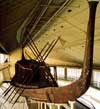 Rather than listening to his wife, Nefrekeptah set off to pharaoh, who approved his mission. Setting up the royal barge, Nefrekeptah took his wife and son to Koptos. Reaching their destination, the priests and priestesses of Isis welcomed the family, and Nefrekeptah made sacrifices to the goddess and her son Horus.
Rather than listening to his wife, Nefrekeptah set off to pharaoh, who approved his mission. Setting up the royal barge, Nefrekeptah took his wife and son to Koptos. Reaching their destination, the priests and priestesses of Isis welcomed the family, and Nefrekeptah made sacrifices to the goddess and her son Horus.
On the fifth day, Nefrekeptah left his family and worked great magic at the river.
First he created a magic cabin that was full of men and tackle. He cast a spell on it, giving life and breath to the men, and he sank the magic cabin into the river. Then he filled the Royal Boat with sand and put out into the middle of the Nile until he came to the place below which the magic cabin lay. And he spoke words of power, and cried, "Workmen, workmen, work for me even where lies the Book of Thoth!" They toiled without ceasing by day and by night, and on the third day they reached the place where the Book lay.
Removing the sand, Nefrekeptah raised the Book till they were at a shoal in the river. And it was as the priest had said - around the iron box, snakes and scorpions twined. They were living, moving beings, ready to kill anyone who dared go near the box. Yet at Nefrekeptah's magic cry, they became quiet and still.
Unharmed, Nefrekeptah went to the iron box, which was guarded by the serpent that could not die. His magic was useless against the reptile, so with his sword, Nefrekeptah lopped off its head. Immediately, the serpent joined together, and made ready to stop the magician from reaching the iron box. Once again, Nefrekeptah beheaded the snake, and tried to toss the head into the river. Yet again, the serpent's head flew to the body and the reptile was alive, protecting the iron box.
Nefrekeptah saw that the serpent could not be slain, but must be overcome by cunning. So once more he struck off its head. But before head and body could come together he put sand on each part so that when they tried to join they could not do so as there was sand between them - and the serpent that could not die lay helpless in two pieces.
Opening the iron box, he found a bronze box. Then a box of sycamore wood. A box of ebony and ivory followed, then a box of silver and finally one of gold, as the priest had said. Opening the gold box, Nefrekeptah found the 'Book of Thoth'.
Reading the first page, Nefrekeptah found that he suddenly had power over the heavens and the earth, the abyss, the mountains and the sea. He understood what the beasts and the fishes were saying. Reading the next spell, he found out the secrets of the sun in the heavens, the moon and the stars. He also could see the gods themselves, who were hidden from the eyes of mortals.
Taking the papyrus, he ordered the workmen to return him to Koptos, where his wife was waiting for him. Offering her the papyrus, Ahura read the first and second spells, and had all of the knowledge that her husband had learned from the Book.
Then Nefrekeptah took a clean piece of papyrus and wrote on it all the spells from the 'Book of Thoth'. He took a cup of beer and washed off the words into it and drank it so that the knowledge of the spells entered into his being.
As they left on the Royal Barge to return home, their son Merab fell into the river and sank out of sight. Using the Book, Nefrekeptah said the correct spell, but the little boy was dead. There was no magic that could bring him back to life. Calling Merab's ka, he asked his son what had caused his death. The parents knew that it was not a normal drowning.

And the ka of Merab said, "Thoth the great god found that his Book had been taken, and he hastened before Amen-Ra, saying, 'Nefrekeptah, son of Pharaoh Amenhotep, has found my magic box and slain its guards and taken my Book with all the magic that is in it.' And Ra replied to him, 'Deal with Nefrekeptah and all that is his as it seems good to you: I send out my power to work sorrow and bring a punishment upon him and upon his wife and child.' And that power from Ra, passing through the will of Thoth, drew me into the river and drowned me."
Heartbroken, they left Merab's body for embalming at Koptos. Soon, the burial of their son was done, and, though sad, Nefrekeptah said that they should return home. Pharaoh should know of what happened, and though sad at the loss of his grandson, he would rejoice in the fact that they had the 'Book of Thoth'.
As they set out, they came to the place where Merab had drowned. Ahura felt the power of Ra take her, and snatch her off the barge. She fell into the river, and she too was drowned. Calling for her ka Nefrekeptah heard the same story, and returned once more to Koptos for his wife's burial.
Setting out for home once more, the boat reached Mennefer (Hikuptah, Memphis). Pharaoh boarded the vessel when it reached port, only to find that Nefrekeptah himself was dead, the 'Book of Thoth' bound on his chest. Pharaoh buried Nefrekeptah with the Book, and the kas of Ahura and Merab came to watch over the man they both loved.
"And now I have told you all the woe that has befallen us because we took and read the Book of Thoth - the book which you ask us to give up. It is not yours, you have no claim to it, indeed for the sake of it we gave up our lives on earth."
The Tale of Setna
Rather than heeding the words of the ka, Setna still wished for the knowledge himself. Again he asked for the Book, or he would take it by force. The two ka were in fear of Setna's powers, and drew back. Now the ka of Nefrekeptah came out from his body to face the magician.
Offering Setna the change to win the Book in a game of Senet, Nefrekeptah and the mortal settled down to play. Nefrekeptah's skill at the game was great, and each time Setna lost, magic was cast upon him so he sank into the ground. When Setna's head was the only part of his body above the ground, he called out for his brother to help him. "Anherru! Run to the palace and beg pharaoh for the Amulet of Ptah. Set it on my head before the last game is lost, and I will be saved!"
Doing as bidden, Anherru begged the favour of pharaoh, then rushed to the priests at the Temple of Ptah. They gave him the Amulet, telling him to rescue his brother from the evil contest with the dead. Making it back to the tomb, just as Setna was making his last move, Anherru leapt forward and dropped the Amulet of Ptah on Setna's head. Before Nefrekeptah could make Setna disappear into the ground forever, Setna sprang free and grabbed the papyrus from the corpse. He and his brother fled from the tomb.
As they went they heard the ka of Ahura cry, "Alas, all power is gone from him who lies in this tomb."
But the ka of Nefrekeptah answered, "Be not sad: I will make Setna bring back the Book of Thoth, and come as a suppliant to my tomb with a forked stick in his hand and a fire-pan on his head."
Returning to the palace, Setna told pharaoh all that had happened, returning the Amulet. Rameses counseled Setna to return the Book, as it had caused much evil and he would be forced to return it eventually, but Setna would not listen. He took it with him, and started studying the great spells, reading from it to those who sought his wisdom.
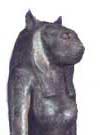 One day, Setna saw a beautiful maiden, who he immediately fell head over heels in love with. Soon he learned that her name was Tabubua, and that she was the daughter of the high priest of Bast, at Per-Bast (Bubastis). Setna soon forgot everything, except Tabubua. He even forgot the 'Book of Thoth', desiring only to win this girl as his own. Before too long, he received a message from her, saying that if he wanted her, he was to meet her in secret at her desert palace outside Per-Bast (Bubastis).
One day, Setna saw a beautiful maiden, who he immediately fell head over heels in love with. Soon he learned that her name was Tabubua, and that she was the daughter of the high priest of Bast, at Per-Bast (Bubastis). Setna soon forgot everything, except Tabubua. He even forgot the 'Book of Thoth', desiring only to win this girl as his own. Before too long, he received a message from her, saying that if he wanted her, he was to meet her in secret at her desert palace outside Per-Bast (Bubastis).
Setna made his way thither in haste, and found a pylon tower in a great garden with a high wall round about it. There Tabubua welcomed him with sweet words and looks, led him to her chamber in the pylon and served him with wine in a golden cup.
Setna, who was already married, spoke of his love for Tabubua. She replied that the two of them were destined to be together, but she could not endure a rival. She asked him to write up a divorce from his current wife, lest she come between them. And she asked him to give her children to him, that they could be given as sacrifices to Bast, lest they plot evil against her, their step mother.
In his ardour, Setna said that it would be as she wished, and immediately wrote out her requests, writing that his wife should be cast out to starve, and that his children should be given to feed the sacred cats at the Temple of Bast.
And when he had done this, she handed him the cup once more and stood before him in all her loveliness, singing a bridal hymn. Presently terrible cries came floating up to the high window of the pylon - the dying cries of his children, for he recognized each voice as it called to him in agony and then was still. But Setna drained the golden cup and turned to Tabubua, saying, "My wife is a beggar and my children lie dead at the pylon foot, I have nothing left in the world but you - and I would give all again for you. Come to me, my love!"
 When he reached out for his new bride, a change suddenly came over her, and she became a corpse, and she and the palace disappeared, leaving Setna alone and naked in the desert.
When he reached out for his new bride, a change suddenly came over her, and she became a corpse, and she and the palace disappeared, leaving Setna alone and naked in the desert.
Reaching home, to his great relief, Setna found his wife and children alive and well. He had learned his lesson. He took the 'Book of Thoth', intent on returning it to Nefrekeptah. Telling Rameses what had happened, the pharaoh told his son that the only way he would not die, now, was to return the Book to the tomb 'as a suppliant, carrying a forked stick in your hand and a fire-pan on your head'.
In humility, the Book was returned. Nefrekeptah, though, told him that the dream of Tabubua would come true unless he would bring the bodies of Ahura and Merab to be buried with him in his tomb. They had no wish to be parted forever, wishing to be together when the 'Day of Awakening' came to pass.
Travelling speedily to Koptos, Setna searched for records of the burial details of Ahura and Merab. Search as he might, he could not find a single clue as to their burial spots. In despair, thinking that the death of his family was near, he offered a great reward to any who could help him. Before too long, an old man came to speak with him. He remembered his grandfather's grandfather showing him the tomb of the woman and child.
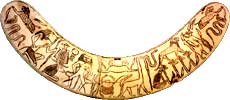 A house had been built on the spot, at the edge of Waset, and Setna bought the house to pull it down. When the house was demolished by Pharaoh's soldiers, Setna had the men dig beneath it. Soon they came to a rock-cut tomb, deep in the earth. Inside the tomb lay the bodies of Ahura and Merab. The old man suddenly transformed, and he turned into the ka of Nefrekeptah and faded from sight. Setna then took the bodies back, and buried them with great ceremony in Nefrekeptah's tomb.
A house had been built on the spot, at the edge of Waset, and Setna bought the house to pull it down. When the house was demolished by Pharaoh's soldiers, Setna had the men dig beneath it. Soon they came to a rock-cut tomb, deep in the earth. Inside the tomb lay the bodies of Ahura and Merab. The old man suddenly transformed, and he turned into the ka of Nefrekeptah and faded from sight. Setna then took the bodies back, and buried them with great ceremony in Nefrekeptah's tomb.
Then at Pharaoh's command they heaped sand over the low stone shrine where the entrance to the tomb was hidden; and before long a sandstorm turned it into a great mound, and then leveled it out so that never again could anyone find a trace of the tomb where Nefrekeptah lay with Ahura and Merab and the Book of Thoth, waiting for the Day of Awakening when Osiris shall return to rule over the earth.
Other Magicians
Another great magician, much stronger than his father, was Se-Osiris. A number of tales were told about this young magician:
Se-Osiris' reading of an Ethiopian wizard's sealed letter (which is, in itself, another tale). The story of how Se-Osiris easily defeats the Ethiopian wizard's powers, proving that Egyptian magic is stronger. The story of Se-Osiris and his father, travelling in ba form, to the underworld to show why he wished his father the poor man's afterlife, rather than the afterlife of the rich man.
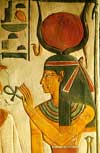 As for woman magicians, Isis herself was a great magician. It was she who, through magic and trickery, found the secret name of Ra. With his name, she took the powers of the sun god for herself. She used spells and great magic to bring her husband back to life herself, and when her son was hiding in the swamp, she was accompanied by scorpions who did her bidding.
As for woman magicians, Isis herself was a great magician. It was she who, through magic and trickery, found the secret name of Ra. With his name, she took the powers of the sun god for herself. She used spells and great magic to bring her husband back to life herself, and when her son was hiding in the swamp, she was accompanied by scorpions who did her bidding.
Egypt was a land of magic and mystery, where even healing skills were bound up in magic and ritual. The gods themselves worked great magic, and the mortal priests and priestesses tried to emulate them. Even the Bible mentions the magicians of ancient Egypt. It's no wonder that Egyptian literature is filled with magical stories and tales, based on the wizards and magicians of long dead pharaohs and their gods.
For more information on Egyptian Magic, see the free e-book, Egyptian Magic by E. A. Wallis Budge.
Can you have a look at my Egyptology Column for more Hieroglyph Lessons, Egyptian gods and goddess articles and more!
PS - One favour I do ask, please e-mail your comments about the articles to kunoichi@thekeep.org because it's your comments that keep me writing! Oh, and can you check out my other articles?
I've added a new search function to make it easier for you to find information in my articles!
© Caroline Seawright 2001